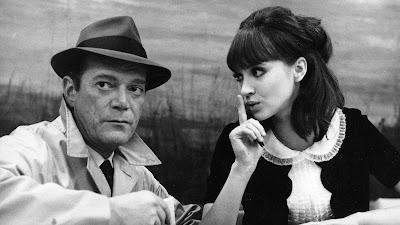Alphaville (1965), Jean-Luc Godard
Where darkness oozes out of every minuscule corners of an estranged city, where emotions are seemingly eradicated as a consequence of manipulative dominance, where the very essence of humanity seems to be at stake and where an unmitigated Utopian discipline takes control of every plausible actions of it's citizens. Such is the grandiose in the mise-en-scène of 'Alphaville, une étrange aventure de Lemmy Caution'.
Jean-Luc Godard's experimental ingenuity in amalgamating the genres of science fiction and film noir in the most Godard-esque process, retaining his signatory elements of progressive rush, jump cuts and stylistic aesthetics of his mystifying characters dominating the screen has inadvertently become one of the finest influential pieces of the said neuromancer films that will be devised from this forth.
The cyberpunk aesthetic that it pulls off, gets subverted through it's portrayal of an humanitarian gloom where through plot traits and gradual character explorations, the haunting revelations of the same start to lurk on. What Godard did with the film, is daring. He not only presented a Noirish aesthetic, away from what he has ever managed to signify in his movies, Godard totally molded the predictable syndromes of the play to form a perpetual degradation of the very basic humanism on the pretext of technological interference or rather dominance. His characters are shady and too weak to steer the plot's course even when their visceral intellect and bodily aura states otherwise. They are merely the victim of Godard's imploding alienation.
‘Alphaville, une étrange aventure de Lemmy Caution’ doesn't gratify it's spectators with acute special effects or absolute futuristic setups. Now that doesn't mean it falls weak in it's visual segment. Rather on the contrary, the foremost thing to determine the potency of the film is it's sensational cinematographic approach which may potentially be the finest that the king of the French New Wave has ever delivered. Or not? Godard on his attempt on the structuring of an idiosyncratic world, kept the existing elements of a contemporary society and modified the necessary elements of the plot to construct a sci fi of ethereal proportions, implying us not to perceive the totalitarian rule as a figment of the future. In brief the devastating void of an emotional spectrum is an enacting and irreversible reality, no less than an existential nightmare.
Atop every single individualistic mitigation of genres, the poetic relay scrutinizing the destiny of human connection through Godard's own deterrent and dehumanized characters (specifically Anna Karina's Natacha Von Braun) is the sole attribute which propels it's mechanism beyond the identifiable products of the French New Wave.







Comments
Post a Comment